天津初一英语(下册)知识点总汇
初一下学期英语重点知识点归纳总结
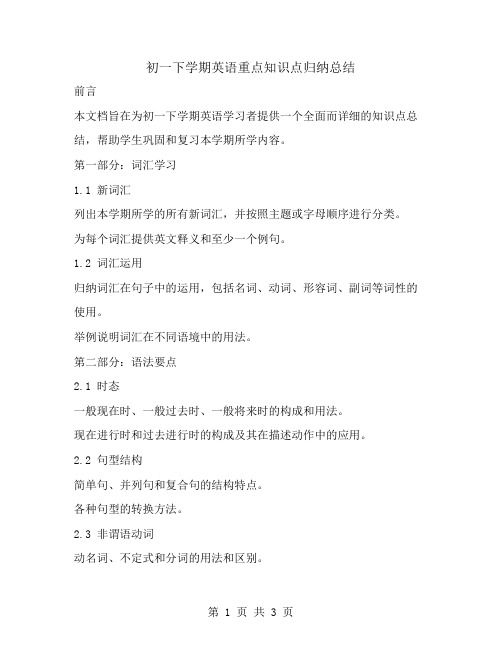
初一下学期英语重点知识点归纳总结前言本文档旨在为初一下学期英语学习者提供一个全面而详细的知识点总结,帮助学生巩固和复习本学期所学内容。
第一部分:词汇学习1.1 新词汇列出本学期所学的所有新词汇,并按照主题或字母顺序进行分类。
为每个词汇提供英文释义和至少一个例句。
1.2 词汇运用归纳词汇在句子中的运用,包括名词、动词、形容词、副词等词性的使用。
举例说明词汇在不同语境中的用法。
第二部分:语法要点2.1 时态一般现在时、一般过去时、一般将来时的构成和用法。
现在进行时和过去进行时的构成及其在描述动作中的应用。
2.2 句型结构简单句、并列句和复合句的结构特点。
各种句型的转换方法。
2.3 非谓语动词动名词、不定式和分词的用法和区别。
非谓语动词在句子中作不同成分的例句。
第三部分:阅读理解3.1 阅读技巧快速阅读和精读的技巧。
如何通过上下文推断词义。
3.2 文章类型描述性文章、叙事性文章、说明性文章和议论性文章的特点。
不同类型文章的阅读策略。
第四部分:写作技巧4.1 写作基础英语写作的基本步骤:构思、草拟、修改。
写作中的常见错误及其纠正。
4.2 写作类型记叙文、说明文、议论文的写作要点。
各类文章的写作模板和结构。
第五部分:听力理解5.1 听力技巧听力前的准备工作。
听力中的笔记技巧和信息捕捉。
5.2 听力材料不同类型的听力材料:对话、短文、新闻等。
针对不同材料的听力策略。
第六部分:口语表达6.1 口语基础发音、语调、节奏的练习方法。
常用口语表达和习语。
6.2 口语实践角色扮演、情景对话的练习。
公共演讲和辩论的技巧。
第七部分:综合运用7.1 跨文化交际英语国家文化习俗的介绍。
如何在交流中体现文化敏感性。
7.2 学习策略有效的英语学习方法和习惯。
时间管理和自我激励的技巧。
结语本总结旨在帮助学生系统地回顾和巩固初一下学期的英语学习内容,为下一学期的学习打下坚实的基础。
七年级英语下册知识点归纳总结
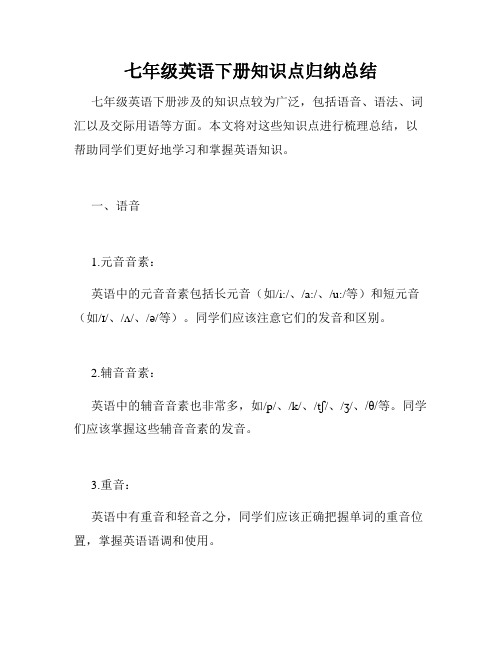
七年级英语下册知识点归纳总结七年级英语下册涉及的知识点较为广泛,包括语音、语法、词汇以及交际用语等方面。
本文将对这些知识点进行梳理总结,以帮助同学们更好地学习和掌握英语知识。
一、语音1.元音音素:英语中的元音音素包括长元音(如/i:/、/a:/、/u:/等)和短元音(如/ɪ/、/ʌ/、/ə/等)。
同学们应该注意它们的发音和区别。
2.辅音音素:英语中的辅音音素也非常多,如/p/、/k/、/tʃ/、/ʒ/、/θ/等。
同学们应该掌握这些辅音音素的发音。
3.重音:英语中有重音和轻音之分,同学们应该正确把握单词的重音位置,掌握英语语调和使用。
二、语法1.名词性物主代词:英语中常用的名词性物主代词有my、your、his、her、its、our、their等。
它们在句子中可以作主语、宾语或定语等,同学们应该掌握它们的用法。
2.一般现在时和现在进行时:一般现在时表示现在经常或习惯性发生的动作或状态,其结构为主语+动词原形。
现在进行时则表示正在进行的动作,其结构为主语+be动词(am、is、are)+动词的-ing形式。
3.一般过去时:一般过去时表示过去某个时间发生的动作或状态,其结构为主语+动词过去式。
对于规则动词,其过去式通常是加-ed;对于不规则动词,其过去式则需背诵。
4.疑问句和否定句:英语中的疑问句和否定句需要使用特殊的语法结构。
疑问句的结构为助动词/情态动词+主语+动词原形,否定句的结构为主语+be动词(am、is、are)/助动词/情态动词+not+动词原形。
三、词汇1.常用词汇:七年级英语下册中包括大量的常用词汇,涉及动物、家庭、交通、食物、健康、学校等方面。
同学们应该掌握这些常用词汇,能够正确地理解和使用它们。
2.动词短语:英语中的动词短语非常丰富,同学们应该学会使用这些动词短语,例如make friends、go shopping、take a walk等。
3.副词和形容词:副词可以修饰动词、形容词等,表示程度、方式等;形容词则可以修饰名词或代词,表示事物的属性或特征等。
七年级下册天津英语知识点
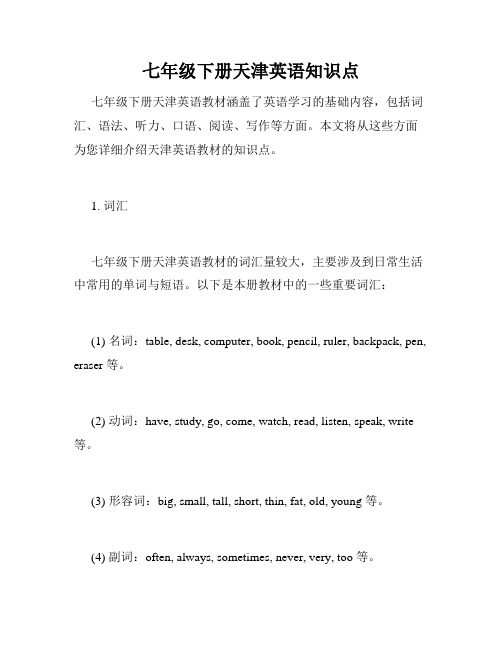
七年级下册天津英语知识点七年级下册天津英语教材涵盖了英语学习的基础内容,包括词汇、语法、听力、口语、阅读、写作等方面。
本文将从这些方面为您详细介绍天津英语教材的知识点。
1. 词汇七年级下册天津英语教材的词汇量较大,主要涉及到日常生活中常用的单词与短语。
以下是本册教材中的一些重要词汇:(1) 名词:table, desk, computer, book, pencil, ruler, backpack, pen, eraser 等。
(2) 动词:have, study, go, come, watch, read, listen, speak, write 等。
(3) 形容词:big, small, tall, short, thin, fat, old, young 等。
(4) 副词:often, always, sometimes, never, very, too 等。
(5) 介词:in, on, at, under, over, beside, between, among 等。
2. 语法七年级下册天津英语教材的语法知识点包括时态、语态、冠词、代词、形容词和副词等。
以下是本册教材中的一些重要语法点:(1) 时态:一般现在时、一般过去时、将来时等。
(2) 语态:被动语态。
(3) 冠词:不定冠词和定冠词。
(4) 代词:人称代词、物主代词、反身代词等。
(5) 形容词和副词:比较级、最高级等。
3. 听力七年级下册天津英语教材的听力内容主要包括听对话和听短文两个部分。
以下是本册教材中的一些重要听力理解技巧:(1) 注意听力文本中的关键词汇。
(2) 善于利用音调、语速等信息。
(3) 遇到难懂的单词,可以先试着猜测它的意思。
(4) 做好笔记,帮助理解和记忆。
4. 口语七年级下册天津英语教材强调口语能力的培养,涉及到日常生活中常用的口语表达。
以下是本册教材中的一些重要口语表达:(1) 问候语:Good morning/afternoon/evening. How are you? 等。
天津初中英语知识点归纳总结
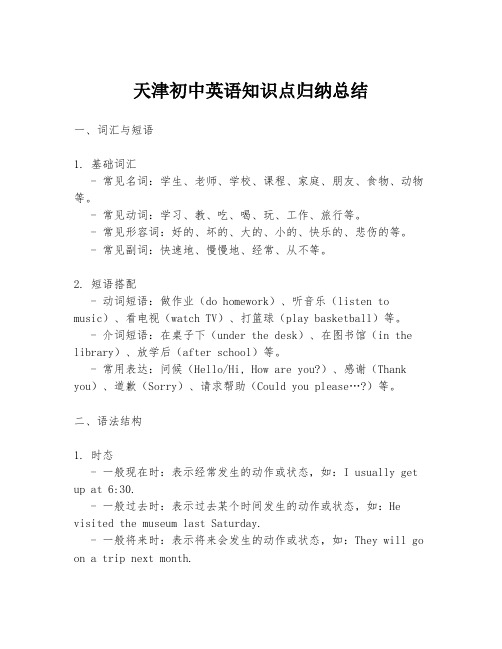
天津初中英语知识点归纳总结一、词汇与短语1. 基础词汇- 常见名词:学生、老师、学校、课程、家庭、朋友、食物、动物等。
- 常见动词:学习、教、吃、喝、玩、工作、旅行等。
- 常见形容词:好的、坏的、大的、小的、快乐的、悲伤的等。
- 常见副词:快速地、慢慢地、经常、从不等。
2. 短语搭配- 动词短语:做作业(do homework)、听音乐(listen to music)、看电视(watch TV)、打篮球(play basketball)等。
- 介词短语:在桌子下(under the desk)、在图书馆(in the library)、放学后(after school)等。
- 常用表达:问候(Hello/Hi, How are you?)、感谢(Thank you)、道歉(Sorry)、请求帮助(Could you please…?)等。
二、语法结构1. 时态- 一般现在时:表示经常发生的动作或状态,如:I usually get up at 6:30.- 一般过去时:表示过去某个时间发生的动作或状态,如:He visited the museum last Saturday.- 一般将来时:表示将来会发生的动作或状态,如:They will go on a trip next month.2. 句型- 陈述句:用来陈述事实或观点,如:The Earth revolves around the Sun.- 疑问句:用来提出问题,如:What time does school start? - 命令句:用来发出命令或请求,如:Please close the door. - 感叹句:用来表达强烈的情感,如:How beautiful the flowers are!3. 语态- 被动语态:强调动作的承受者,如:The book was written by the famous author.4. 非谓语动词- 动名词:作为名词使用,如:Swimming is my favorite sport. - 分词:作为形容词或副词使用,如:The boy waiting for the bus is my friend.三、阅读理解1. 技巧- 快速阅读:通过扫读快速抓住文章大意。
初一七年级下册英语知识点
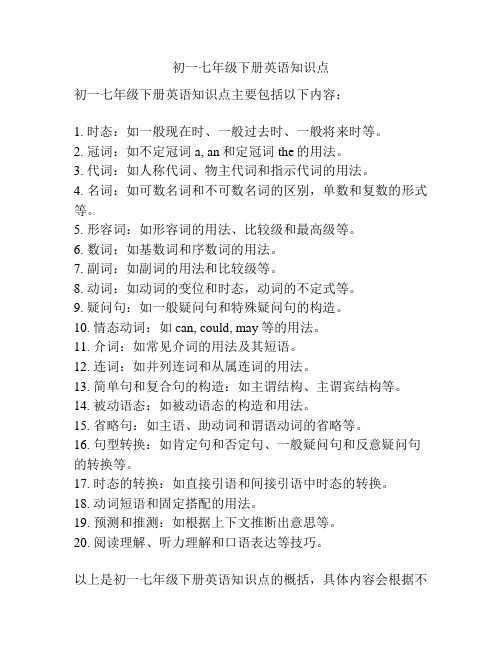
初一七年级下册英语知识点
初一七年级下册英语知识点主要包括以下内容:
1. 时态:如一般现在时、一般过去时、一般将来时等。
2. 冠词:如不定冠词a, an和定冠词the的用法。
3. 代词:如人称代词、物主代词和指示代词的用法。
4. 名词:如可数名词和不可数名词的区别,单数和复数的形式等。
5. 形容词:如形容词的用法、比较级和最高级等。
6. 数词:如基数词和序数词的用法。
7. 副词:如副词的用法和比较级等。
8. 动词:如动词的变位和时态,动词的不定式等。
9. 疑问句:如一般疑问句和特殊疑问句的构造。
10. 情态动词:如can, could, may等的用法。
11. 介词:如常见介词的用法及其短语。
12. 连词:如并列连词和从属连词的用法。
13. 简单句和复合句的构造:如主谓结构、主谓宾结构等。
14. 被动语态:如被动语态的构造和用法。
15. 省略句:如主语、助动词和谓语动词的省略等。
16. 句型转换:如肯定句和否定句、一般疑问句和反意疑问句的转换等。
17. 时态的转换:如直接引语和间接引语中时态的转换。
18. 动词短语和固定搭配的用法。
19. 预测和推测:如根据上下文推断出意思等。
20. 阅读理解、听力理解和口语表达等技巧。
以上是初一七年级下册英语知识点的概括,具体内容会根据不
同教材和学校的教学要求而有所差异。
在学习英语的过程中,需要多加练习和巩固,尤其是注重语法和词汇的积累,同时提高听说读写能力。
七下英语必考知识点

七下英语必考知识点摘要:1.必考知识点概述2.名词3.动词4.形容词5.副词6.介词7.代词8.句子结构9.语法规则10.学习建议正文:【必考知识点概述】在初中英语课程中,七年级下学期的知识点是学习的基础,也是未来学习的重要铺垫。
本篇文章将为大家详细介绍七年级下学期英语必考的知识点,帮助同学们更好地掌握这些知识点。
【名词】名词是英语中表示人、物、地方或抽象概念的词。
在七年级下学期,同学们需要掌握名词的用法,包括名词的单复数形式、名词所有格以及名词的格。
【动词】动词是表示动作或状态的词。
在七年级下学期,同学们需要学习动词的基本形式,包括动词的三种时态:一般现在时、一般过去时和一般将来时。
此外,还需要了解动词的语态和情态动词的用法。
【形容词】形容词是用来修饰名词的词,表示人或物的性质、特征或状态。
在七年级下学期,同学们需要掌握形容词的基本用法,包括形容词的比较级和最高级。
【副词】副词是用来修饰动词、形容词或其他副词的词,表示动作或状态的程度、方式、地点或时间。
在七年级下学期,同学们需要学习副词的基本用法,包括副词的比较级和最高级。
【介词】介词是用来表示名词、代词或其他词类之间关系的词。
在七年级下学期,同学们需要掌握介词的基本用法,了解介词短语的构成以及介词的固定搭配。
【代词】代词是一种可以替代名词、数词、形容词或副词的词。
在七年级下学期,同学们需要学习代词的基本用法,包括人称代词、物主代词、指示代词和疑问代词。
【句子结构】在七年级下学期,同学们需要学习英语的基本句子结构,包括主谓宾结构、主系表结构和主谓宾宾补结构。
通过学习句子结构,同学们可以更好地理解句子的意义和组成。
【语法规则】在七年级下学期,同学们需要掌握一些基本的语法规则,如词类的转换、句子成分的分析以及句子的改写。
这些语法规则对于提高同学们的英语表达能力具有重要意义。
【学习建议】为了更好地掌握七年级下学期英语必考知识点,同学们可以采取以下学习建议:1.建立知识体系,系统学习英语语法;2.多做练习题,提高自己的英语应用能力;3.创设实际语境,进行口语交流,提高自己的口语表达能力;4.及时复习,巩固所学知识。
初一英语下册全册知识点归纳

初一英语下册全册知识点归纳初一英语下册全册知识点归纳英语是按照分布面积而言最流行的语言,但母语者数量是世界第三,仅次于汉语、西班牙语。
它是学习最广泛的第二语言,是近60个主权国家的官方语言或官方语言之一。
下面是店铺为大家整理的初一英语下册全册知识点归纳,欢迎阅读与收藏。
动词不规则变化:见书上表格Unit 12 What did u d last weeend?一:词组1. last weeend 上周末2. d ne’s hewr 做作业3. g t the cinea 看电影4. g bating 去划船5.cap b the lae 在湖边露营6.g t the beach 去海滩7.n Saturda rning 在周四早上8.stud fr the English test为了英语考试学 9. wr as a guide 做为一个导游工作10. ind f tired 有点儿累 11.sta up 熬夜 12. pla with sb. 和某人玩13. lse things 丢东西 14. fl a ite 放风筝 15. tae sb. t sp. 把某人带到某地16.as a special gift作为一个特殊的礼物 17. g caping 去露营18. put up the tents 搭建帐篷 19.ae a fire 生火 20. eep sb. war 使某人保持温暖21. s...that... 太以至于 22. g t sleep 去睡觉23. see sb. ding sth. 看见某人正在做某事 24. up up and dwn 上蹦下跳25. clib nt ne’s bac 爬到背上 26. shut at=shut t 大声喊叫27. run awa 逃跑28 it’s + ad + t d sth.29. learn a secnd language 学习第二语言 30. sta at he 呆在家31. read a b 读书g n vacatin g t suer cap sta at hestud fr exas Central Par shw sth t sb.help hi find his father wal bac t… g shppingthe Palace Museu thin f have fun ding sth.bus trip the Great Wall Tian’an Men Squareae sb d sth decide t d sth all da二:用法集萃1. g + ding 去做某事2. pla + 球类玩球3. 时间段+ ag 前4. eep + sb. / sth. + 形容词 / 副词 / 介词短语使保持5. s + 形容词 / 副词+ that 句子如此以至于6. see sb. ding sth. 看见某人正在做某事7. let sb. d sth. 让某人做某事8. start t d / ding sth. 开始做某事三:典句必背1. —What did u d last weeend? 上个周末你做什么了?—I did hewr. / We went bating. 我做了我的.家庭作业。
初一英语下册重点归纳
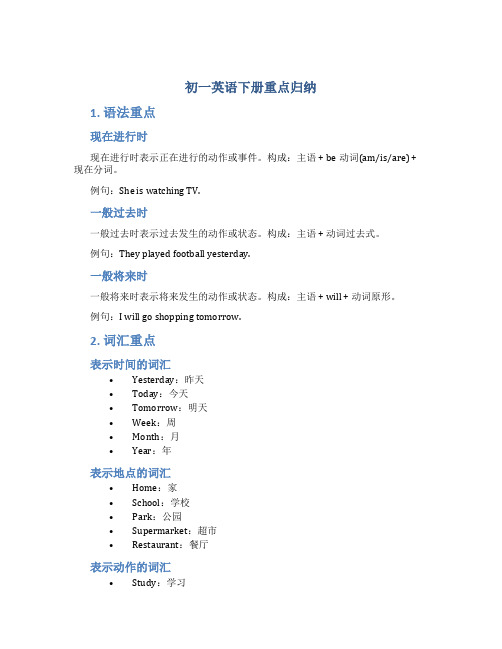
初一英语下册重点归纳1. 语法重点现在进行时现在进行时表示正在进行的动作或事件。
构成:主语 + be动词(am/is/are) + 现在分词。
例句:She is watching TV.一般过去时一般过去时表示过去发生的动作或状态。
构成:主语 + 动词过去式。
例句:They played football yesterday.一般将来时一般将来时表示将来发生的动作或状态。
构成:主语 + will + 动词原形。
例句:I will go shopping tomorrow.2. 词汇重点表示时间的词汇•Yesterday:昨天•Today:今天•Tomorrow:明天•Week:周•Month:月•Year:年表示地点的词汇•Home:家•School:学校•Park:公园•Supermarket:超市•Restaurant:餐厅表示动作的词汇•Study:学习•Play:玩•Eat:吃•Drink:喝•Run:跑3. 内容重点下册的内容主要围绕日常生活展开,包括学校、家庭、食物、运动等方面的话题。
3.1 学校生活学校生活是初中生活中的重要组成部分,下册的课程里包含了与学校相关的话题。
例如:•My School Life:介绍自己的学校生活。
•My Favorite Subject:谈论自己最喜欢的科目。
•After-school Activities:讨论课外活动。
3.2 家庭生活家庭生活是每个人日常生活中的核心,下册的课程中也涉及了与家庭有关的内容。
例如:•My Family:介绍自己的家庭成员。
•Weekend Plans:计划自己的周末活动。
•Family Traditions:谈论家族传统。
3.3 食物与饮食食物与饮食是人们生活中必不可少的一部分,下册的课程中也会提到与食物有关的话题。
例如:•My Favorite Food:介绍自己最喜欢的食物。
•Healthy Eating:讨论健康饮食习惯。
天津耀华滨海学校初中英语七年级下册期末知识点总结(培优)
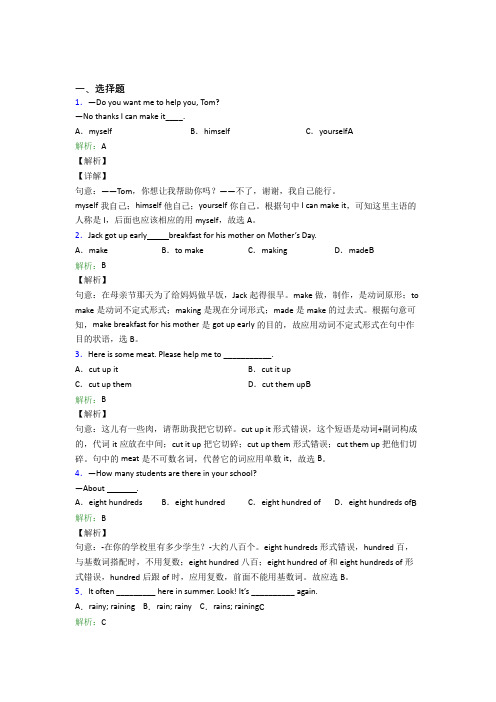
一、选择题1.—Do you want me to help you, Tom?—No thanks I can make it____.A.myself B.himself C.yourself A解析:A【解析】【详解】句意:——Tom,你想让我帮助你吗?——不了,谢谢,我自己能行。
myself我自己;himself他自己;yourself你自己。
根据句中 I can make it,可知这里主语的人称是I,后面也应该相应的用myself,故选A。
2.Jack got up early breakfast for his mother on Mother’s Day.A.make B.to make C.making D.made B解析:B【解析】句意:在母亲节那天为了给妈妈做早饭,Jack起得很早。
make做,制作,是动词原形;to make是动词不定式形式;making是现在分词形式;made是make的过去式。
根据句意可知,make breakfast for his mother是got up early的目的,故应用动词不定式形式在句中作目的状语,选B。
3.Here is some meat. Please help me to ___________.A.cut up it B.cut it upC.cut up them D.cut them up B解析:B【解析】句意:这儿有一些肉,请帮助我把它切碎。
cut up it形式错误,这个短语是动词+副词构成的,代词it应放在中间;cut it up把它切碎;cut up them形式错误;cut them up把他们切碎。
句中的meat是不可数名词,代替它的词应用单数it,故选B。
4.—How many students are there in your school?—About .A.eight hundreds B.eight hundred C.eight hundred of D.eight hundreds of B 解析:B【解析】句意:-在你的学校里有多少学生?-大约八百个。
七年级下册英语知识点天津专用
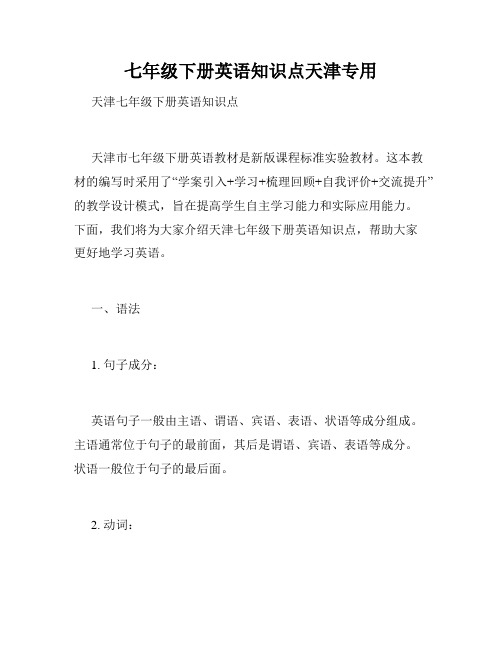
七年级下册英语知识点天津专用天津七年级下册英语知识点天津市七年级下册英语教材是新版课程标准实验教材。
这本教材的编写时采用了“学案引入+学习+梳理回顾+自我评价+交流提升”的教学设计模式,旨在提高学生自主学习能力和实际应用能力。
下面,我们将为大家介绍天津七年级下册英语知识点,帮助大家更好地学习英语。
一、语法1. 句子成分:英语句子一般由主语、谓语、宾语、表语、状语等成分组成。
主语通常位于句子的最前面,其后是谓语、宾语、表语等成分。
状语一般位于句子的最后面。
2. 动词:动词是英语语法中非常重要的一部分,主要承担句子中的谓语作用。
常见的动词形式有基本形式、过去式和过去分词三种。
3. 时态:英语中的时态是指谓语动词表示的动作或状态所处的时间。
常见的时态有一般现在时、一般过去时、一般将来时等。
4. 形容词和副词:形容词和副词在英语语法中都是用来修饰名词的,形容词主要是修饰名词的性质和特征,而副词则主要是修饰动词、形容词和其他副词。
二、词汇1. 名词:英语名词的形式多样,包括可数名词和不可数名词。
可数名词又分为单数和复数两种形式。
名词还可以根据其性质和用途进一步划分为专有名词、抽象名词、物质名词等。
2. 代词:代词是一种替代名词的词类,可以替代名词在句子中的位置。
代词的种类包括人称代词、物主代词、指示代词、疑问代词、不定代词等。
3. 动词:动词是英语语言中最核心的词汇之一,用来表达行为、状态和经验等。
根据其形式,动词可以分为及物动词和不及物动词等。
4. 形容词和副词:形容词和副词在英语语言中都是用来修饰名词和动词的,常见的形容词有形容词的比较级和最高级,副词则有副词的比较级和最高级。
三、阅读技巧1. 整体把握:整体把握是指读完文章后对整篇文章的主旨和大意进行总体上的理解和把握。
2. 熟练掌握词汇:为了更好地理解和掌握文章,熟练掌握文章中出现的关键词汇和生词是非常必要的。
3. 注意文章结构:文章结构也是阅读的一项重要技巧,通常文章会分为引言、正文和结论三个部分,我们需要仔细阅读每一部分。
七年级英语天津市知识点归纳总结

七年级英语天津市知识点归纳总结英语是作为一门重要的学科在七年级中占据着重要的地位。
在天津市的七年级英语教学中,有许多重要的知识点需要我们掌握和归纳总结。
下面将对七年级英语天津市知识点进行归纳总结,帮助同学们更好地复习和掌握。
一、基础语法知识1. 时态:在七年级英语中,我们需要掌握一般现在时、一般过去时和将来时等基本的时态。
其中,一般现在时表示现在经常或习惯性发生的动作或状态;一般过去时表示过去发生的动作或状态;将来时表示将来将要发生的动作或状态。
2. 数词:学习和掌握基本的数词是非常重要的。
如基数词和序数词的使用,以及如何表示日期和数量等。
3. 代词:在句子中,代词可以替代名词,起到节省词语和简化句子结构的作用。
学习和掌握常见的代词,如人称代词、物主代词和反身代词等。
4. 形容词和副词:形容词用来修饰名词,副词用来修饰动词、形容词和其他副词。
学习如何正确使用形容词和副词是非常重要的。
二、基础词汇1. 名词:名词是指人、事、物或抽象概念的名称。
学习和识记常见的名词是我们扩充词汇量的基础。
2. 动词:动词是表示人、物或抽象概念的行为或状态的词语。
学习和掌握常见的动词,并了解不同动词的不同用法。
3. 形容词:形容词用来描述名词,学习一些常见的形容词并了解其用法。
4. 副词:副词用来修饰动词、形容词和其他副词,学习一些常用的副词有助于提高语言表达能力。
三、日常对话1. 问候和自我介绍:学习如何与他人进行简单的问候和自我介绍是生活中非常重要的交际技巧。
2. 家庭和个人情况介绍:能够用简单的句式和词汇介绍自己的家庭和个人情况是表达自己的有效方式。
3. 购物和用餐:学习和掌握购物和用餐的基本对话内容可以帮助我们在实际生活中更好地沟通。
四、阅读技巧和语篇理解在英语学习过程中,阅读理解是非常重要的。
我们需要学习如何理解文章的主旨、大意和细节,并能够根据上下文推测词义。
五、写作技巧1. 书面表达:学会用英语进行简单的书面表达,如写信、日记和电子邮件等。
英语知识点归纳七年级天津
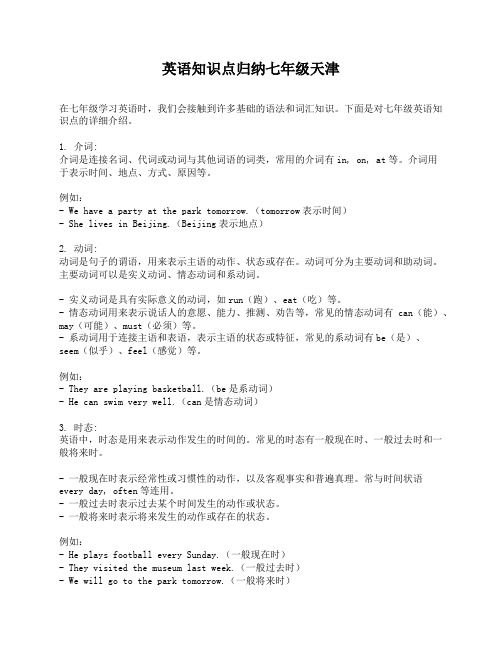
英语知识点归纳七年级天津在七年级学习英语时,我们会接触到许多基础的语法和词汇知识。
下面是对七年级英语知识点的详细介绍。
1. 介词:介词是连接名词、代词或动词与其他词语的词类,常用的介词有in, on, at等。
介词用于表示时间、地点、方式、原因等。
例如:- We have a party at the park tomorrow.(tomorrow表示时间)- She lives in Beijing.(Beijing表示地点)2. 动词:动词是句子的谓语,用来表示主语的动作、状态或存在。
动词可分为主要动词和助动词。
主要动词可以是实义动词、情态动词和系动词。
- 实义动词是具有实际意义的动词,如run(跑)、eat(吃)等。
- 情态动词用来表示说话人的意愿、能力、推测、劝告等,常见的情态动词有can(能)、may(可能)、must(必须)等。
- 系动词用于连接主语和表语,表示主语的状态或特征,常见的系动词有be(是)、seem(似乎)、feel(感觉)等。
例如:- They are playing basketball.(be是系动词)- He can swim very well.(can是情态动词)3. 时态:英语中,时态是用来表示动作发生的时间的。
常见的时态有一般现在时、一般过去时和一般将来时。
- 一般现在时表示经常性或习惯性的动作,以及客观事实和普遍真理。
常与时间状语every day, often等连用。
- 一般过去时表示过去某个时间发生的动作或状态。
- 一般将来时表示将来发生的动作或存在的状态。
例如:- He plays football every Sunday.(一般现在时)- They visited the museum last week.(一般过去时)- We will go to the park tomorrow.(一般将来时)4. 名词:名词是指人、事物、地方和抽象概念等的名称。
七年级英语下册知识点归纳总结

七年级英语下册知识点归纳总结词汇和短语:学生需要掌握并理解新的词汇和短语,包括名词、动词、形容词、副词等。
例如,“by the pool”表示“在游泳池边”,“drink orange juice”表示“喝橙汁”,“study hard”表示“努力学习”,“on a vacation”表示“在度假”,“in the mountains”表示“在山里”,“call sb.”表示“给某人打电话”,“write to sb.”表示“给某人写信”等。
语法:学生需要学习并掌握新的语法知识,如时态、语态、直接引语和间接引语、定语从句等。
例如,在七年级下册的英语教材中,学生将学习到一般现在时、现在进行时、一般过去时等时态的用法。
句子结构:学生需要理解并能够运用不同的句子结构,如简单句、并列句和复合句。
例如,“I can speak English and I can also play soccer.”就是一个并列句,表示“我会说英语也会踢足球”。
写作:学生需要练习写作,包括写作短文、电子邮件、日记等。
他们需要学习如何组织思想、使用正确的语法和词汇、以及使用适当的句子结构。
阅读理解:学生需要提高阅读理解能力,能够理解并回答与阅读材料相关的问题。
他们需要学习如何快速阅读、寻找关键信息、以及理解作者的意图。
听力:学生需要提高听力理解能力,能够听懂并回答与听力材料相关的问题。
他们需要学习如何捕捉关键信息、理解对话或独白的大意、以及识别不同的语音和语调。
口语:学生需要练习口语,包括发音、语调、语速等。
他们需要学习如何与他人交流、表达自己的观点、以及使用适当的词汇和语法。
总的来说,七年级英语下册的知识点涵盖了词汇、语法、句子结构、写作、阅读理解、听力和口语等方面。
学生需要综合运用这些知识点来提高自己的英语能力。
初一英语下册知识点归纳
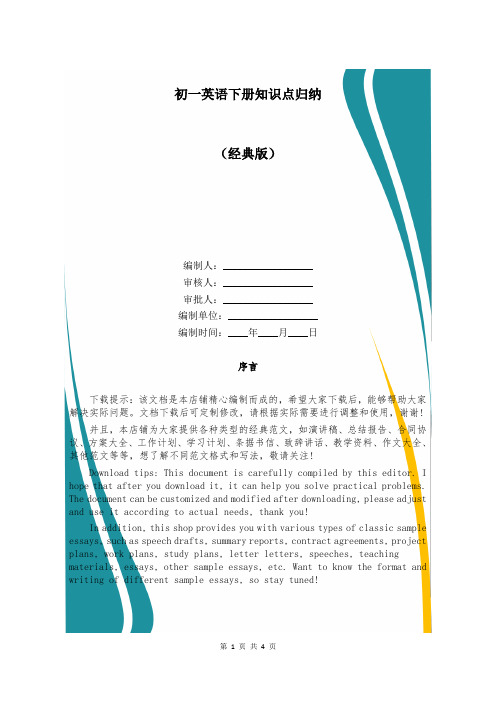
初一英语下册知识点归纳(经典版)编制人:__________________审核人:__________________审批人:__________________编制单位:__________________编制时间:____年____月____日序言下载提示:该文档是本店铺精心编制而成的,希望大家下载后,能够帮助大家解决实际问题。
文档下载后可定制修改,请根据实际需要进行调整和使用,谢谢!并且,本店铺为大家提供各种类型的经典范文,如演讲稿、总结报告、合同协议、方案大全、工作计划、学习计划、条据书信、致辞讲话、教学资料、作文大全、其他范文等等,想了解不同范文格式和写法,敬请关注!Download tips: This document is carefully compiled by this editor. I hope that after you download it, it can help you solve practical problems. The document can be customized and modified after downloading, please adjust and use it according to actual needs, thank you!In addition, this shop provides you with various types of classic sample essays, such as speech drafts, summary reports, contract agreements, project plans, work plans, study plans, letter letters, speeches, teaching materials, essays, other sample essays, etc. Want to know the format and writing of different sample essays, so stay tuned!初一英语下册知识点归纳要学会把新知识和已学知识联系起来,不断糅合、完善你的知识体系。
天津七年级下册英语词汇(英)
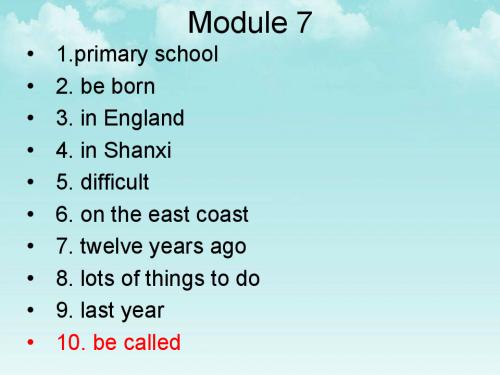
• 11. be friendly to sb • 12. What is he like? He is strict. • 13. be bored with • 14. on the wall
Module 8
• • • • • • • • • •
1. once upon a time 2. in the forest 3. look into 4. look around 5. knock on the door 6. a girl with hair of gold 7. push the door 8. go for a walk=take a walk 9. decide to do sth 10. try to do sth
• • • •
21. wave to say goodbye 22. say hello/ goodbye to sb 23. on time 24. hold on to
Modul 12
• • • • • • • • • • 1. Beijing Opera 2. the capital of Austria 3. think about 4. Western Music 5. traditional music 6. European classical music 7. by sb 8. one of the +adj +复数名词 9. the center of 10. on the river
Moduld 9
• • • • • • • • 1. at the age of= when sb was +年龄 2. Spring Festive 3. Teachers’ Day 4. Women’s Day 5. National Day 6. Children’s Day 7. New Year’s Day 8. be difficult from
天津初一英语下册知识点总汇

天津初一英语下册知识点总汇◆Unit 1.Where’s the post office?目标语言:ask for and give directions on the street重点句型:Is there a bank near here? Yes, there’s a bank on Center Street.Is there a supermarket? Yes, there is. No, there isn’t.Where’s the supermarket? It’s next to the library.The pay phone is across from the library.The pay phone is next to the library.The pay phone is between the post office and the library.The pay phone is on Green Street.Just go straight and turn left.It’s down Bridge Street on the right. It’s next to a supermarket.Is there a big supermarket near where you live?重点词组:across from, on the street, between…and…, next to, in the neighborhood, go straigh t, turn left, on the right(left), on the avenue, take a walk, in the hotel, the beginning of, have fun doing, on a bench, the way to, take a taxi, go down, go through, have a good trip,welcome to+n.,the way to+n去。
天津市专用七年级下册英语第二模块整理知识点
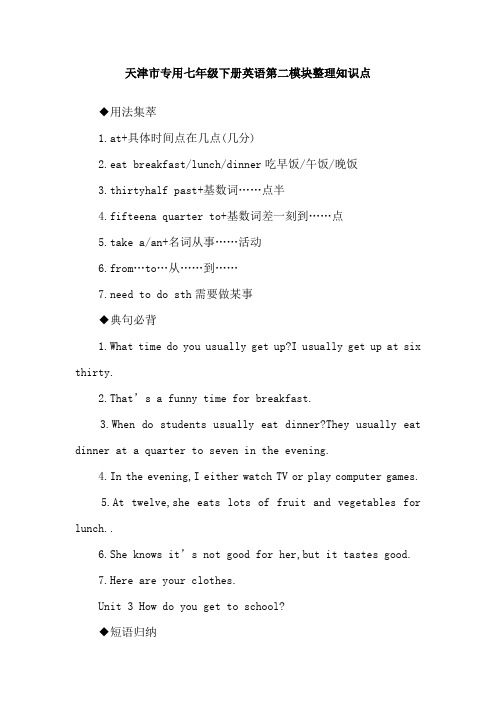
天津市专用七年级下册英语第二模块整理知识点◆用法集萃1.at+具体时间点在几点(几分)2.eat breakfast/lunch/dinner吃早饭/午饭/晚饭3.thirtyhalf past+基数词……点半4.fifteena quarter to+基数词差一刻到……点5.take a/an+名词从事……活动6.from…to…从……到……7.need to do sth需要做某事◆典句必背1.What time do you usually get up?I usually get up at six thirty.2.That’s a funny time for breakfast.3.When do students usually eat dinner?They usually eat dinner at a quarter to seven in the evening.4.In the evening,I either watch TV or play computer games.5.At twelve,she eats lots of fruit and vegetables for lunch..6.She knows it’s not good for her,but it tastes good.7.Here are your clothes.Unit 3 How do you get to school?◆短语归纳1.get to school到达学校2.take the subway乘地铁3.ride a bike骑自行车4.how far多远5.from home to school从家到学校6.every day每天7.take the bus乘公共汽车8.by bike骑自行车9.bus stop公共汽车站10.think of认为11.between…and…在…和…之间12.one 11-year-old boy一个11岁的男孩13.play with…和…玩e true实现15.have to不得不◆用法集萃1.take…to…=go to…by…乘…去…2.How do/does(sb)get to…?…是怎样到…的?3.How far is it from…to…?从…到…有多远?4.It takes sb.some time to do sth.做某事花费某人多长时间。
七年级l下册英语全部知识点总结
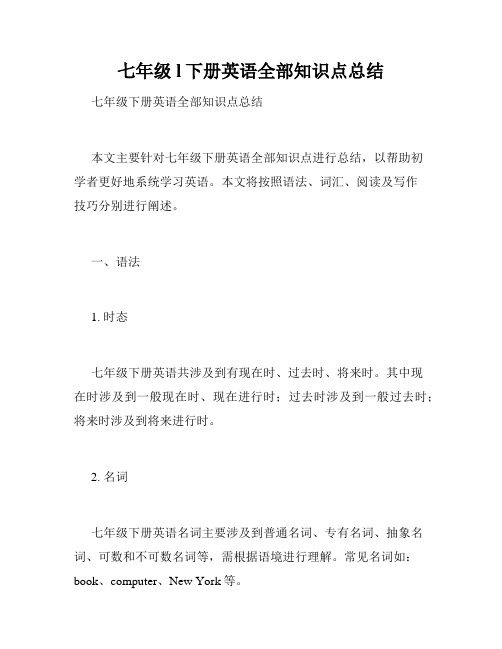
七年级l下册英语全部知识点总结七年级下册英语全部知识点总结本文主要针对七年级下册英语全部知识点进行总结,以帮助初学者更好地系统学习英语。
本文将按照语法、词汇、阅读及写作技巧分别进行阐述。
一、语法1. 时态七年级下册英语共涉及到有现在时、过去时、将来时。
其中现在时涉及到一般现在时、现在进行时;过去时涉及到一般过去时;将来时涉及到将来进行时。
2. 名词七年级下册英语名词主要涉及到普通名词、专有名词、抽象名词、可数和不可数名词等,需根据语境进行理解。
常见名词如:book、computer、New York等。
3. 形容词七年级下册英语形容词涉及到物质与非物质的描述。
常见的形容词如:beautiful、happy、hardworking、tall等。
4. 动词七年级下册英语动词涉及到动作和状态的区分,常见动词如:run、walk、swim、study等。
二、词汇1. 常用单词七年级下册英语常用单词约有1000个左右,这些单词大多数来源于生活中的实用场景,如:family、friend、school等。
在学习英语过程中,要注重积累常用单词。
2. 词根、词缀词根、词缀能够帮助我们更好的记忆和理解英语单词的构成和意义。
常见的词根、词缀如:un-、re-、dis-等。
三、阅读七年级下册英语阅读主要涉及到句子理解、文章理解等。
在阅读过程中,应理解文章的主旨和重点,从而更好地抓住文章的重点和精髓。
四、写作技巧1. 写作步骤七年级下册英语写作步骤大致为:构思、列提纲、写作与修改等。
在写作时,应注意文章结构的合理性、单词和句子的准确性等。
2. 常见写作形式七年级下册英语常见写作形式有:短文写作、书信写作、日记写作等。
在写作时需注意语言表达的准确性和合理性。
综上所述,七年级下册英语全部知识点主要涉及到语法、词汇、阅读及写作技巧等多个方面。
学生在学习英语过程中,应该注重掌握语法和词汇,同时通过阅读和写作来提高英语的水平。
初一英语下册知识点归纳
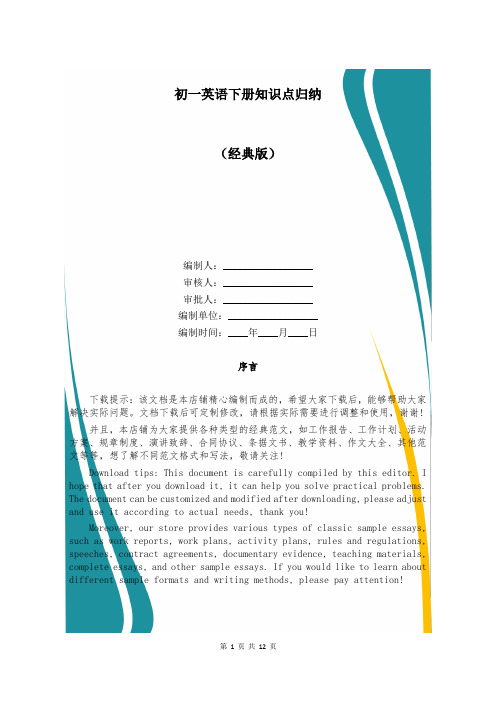
初一英语下册知识点归纳(经典版)编制人:__________________审核人:__________________审批人:__________________编制单位:__________________编制时间:____年____月____日序言下载提示:该文档是本店铺精心编制而成的,希望大家下载后,能够帮助大家解决实际问题。
文档下载后可定制修改,请根据实际需要进行调整和使用,谢谢!并且,本店铺为大家提供各种类型的经典范文,如工作报告、工作计划、活动方案、规章制度、演讲致辞、合同协议、条据文书、教学资料、作文大全、其他范文等等,想了解不同范文格式和写法,敬请关注!Download tips: This document is carefully compiled by this editor. I hope that after you download it, it can help you solve practical problems. The document can be customized and modified after downloading, please adjust and use it according to actual needs, thank you!Moreover, our store provides various types of classic sample essays, such as work reports, work plans, activity plans, rules and regulations, speeches, contract agreements, documentary evidence, teaching materials, complete essays, and other sample essays. If you would like to learn about different sample formats and writing methods, please pay attention!初一英语下册知识点归纳初一英语下册知识点归纳总结初一的学生想学好英语,为以后高年级的英语打下良好基础?那就要养成课后复习巩固的学习习惯。
- 1、下载文档前请自行甄别文档内容的完整性,平台不提供额外的编辑、内容补充、找答案等附加服务。
- 2、"仅部分预览"的文档,不可在线预览部分如存在完整性等问题,可反馈申请退款(可完整预览的文档不适用该条件!)。
- 3、如文档侵犯您的权益,请联系客服反馈,我们会尽快为您处理(人工客服工作时间:9:00-18:30)。
初一英语下册知识点总汇◆Unit 1.Where’s the post office?目标语言:ask for and give directions on the street重点句型:Is there a bank near here? Yes, there’s a bank on Center Street.Is there a supermarket? Yes, there is. No, there isn’t.Where’s the sup er market? It’s next to the library.The pay phone is across from the library.The pay phone is next to the library.The pay phone is between the post office and the library.The pay phone is on Green Street.Just go straight and turn left.It’s down Bridge Street on the right. It’s next to a supermarket.Is there a big supermarket near where you live?重点词组:across from, on the street, between…and…, next to, in the neighborhood, go straigh t, turn left, on the right(left), on the avenue, take a walk, in the hotel, the beginning of, have fun doing, on a bench, the way to, take a taxi, go down, go through, have a good trip,welcome to+n.,the way to+n去。
的路,hope to do知识点:1.there be 句型(1)there be 句型常用来表示某地/某时有某物/某人。
(2)各种句型结构:肯定句:There+be (is/are)+某物/某人+地点/时间。
否定句:There+be(is/are)+not+某物/某人+地点/时间。
一般疑问句:Be(Is/Are)+there+某物/某人+地点/时间?特殊疑问句:特殊疑问词+be(is/are)+there+其它?e.g. There is a pencil on the desk. 桌子上有一支铅笔。
否定句:There isn't a pencil on the desk. 桌子上没有铅笔。
一般疑问句:Is there a pencil on the desk? 桌子上有铅笔吗?特殊疑问句(划线部分提问):What's on the desk? 桌子上有什么?注意:There be后面所接的某物有多个时,谓语动词be要根据最靠近它的那个名词的单复数来确定,即就近原则。
e.g. There is a pen, a pencil-box and some books on my desk.我的桌子上有一支钢笔,一个铅笔盒和一些书。
There are some books, a pen and a pencil-box on my desk.2.Where引导的特殊疑问句句式:Where +一般疑问句?用法:表示“在哪儿”,提问地点,方位等。
1)询问来自何处-Where are you from?-I am from England.2) 询问去何处-Where are you going?- I am going to the zoo.3) 询问物品位置-Where are my shoes?-They are under your bed.4) 询问某人位置-Where is Tom?-Look! He is in the tall tree.【注意】1和不熟悉的英美人见面打招呼时,不能问Where are you going?因为这涉及到对方的隐私。
否则,对方有可能说“It’s none of your business.”这不管你的事。
2.在英语中,询问某人地址在哪,用What’s your address?3. 在回答某人,某物所处的位置时,一定要用准表示方位的介词。
如at,in,on,next to, near等。
3.本单元的方位介词across from在。
对面next to 紧挨着between …and在。
与。
之间on 在。
上in 在。
里4.词语辨析across & throughAcross 和through两个介词都有“穿过”的意思,用法却不同。
Across的含义与on有关,表示动作在某一物体的表面进行,常指从宽度意思上讲的“横穿/跨”。
Through的含义in有关,表示动作在某物体的空间进行。
Arrive in& arrive atArrive at表示到达较小的地方;arrive in表示到达较大的地方。
5.Let sb.(宾格)do sth.让某人做某事。
Let后面的动词要用动词原形。
6.问路的句式小结:1)“特殊疑问句”类句型a)Excuse me. Where is the …,please?b)Excuse me. Which is the way to the…,please?c)Excuse me. How can I get to the…, please?2)“一般疑问句”类句型a)Could/Can you tell me how I can get to the…?b)Could /Can you tell me the way to the…?c)Could/Can you tell me how to get to the…,please?d)Could /Can you tell me which is the way to the…?e)Excuse me. Is this the right way to the…?f)Excuse me. Do you know the way to the…?◆unit 2 Why do you like koala bears?目标语言:Describe animals; express preferences重点句型:Let’s see the lions.Why do you want to see the lions? Because they are cute.Why does he like koala bears? Because they are kind of interesting.Where are lions from? They are from Africa.What animals do you like? I like elephants.What other animals do you like? I like dogs, too.重点词组:want to do sth.想要做某事,kind of有点儿,be from=come from来自,…years old。
岁,play with与。
一起玩,at night在夜里,在晚上,get up起床,every day每天,look at 看,give sb. sth=give sth. to sb.把某物给某人,be friendly to sb对某人友好(强调对某人的态度)be friendly with sb和某人友好(强调和某人的关系)in a friendly way以友好的方式,go to sleep就寝,入睡get to sleep入睡(由于某种原因睡不着,想方设法入睡)fall asleep入睡(入睡的状态)go to bed上床睡觉(不一定睡着)知识点:1.why ,what, where引导的特殊疑问句及其回答1)句型结构:Why/What/Where+一般疑问句?2)语法功能:why用来询问原因,what一般用来对物提问,另外what还用来对职业提问,如,What is he?他是做什么的?,where对地点提问。
2.kind的用法kind of有点,稍微;a kind of一种;kinds of各种kind 作形容词,为“善良的,好心的”She is a kind woman.她是个善良的女人。
3.Other作形容词时,为“其他的,另外的”,用做定语。
后接不可数名词或可数名词复数形式。
4.年龄的表达方式He is 12 years old.He is 12.His age is 12.5. Isn’t he cute?此句为否定疑问句,表达一种赞赏,往往不需要对方回答,句末用降调。
如,Is n’t the film very interesting?难道这部电影不是很有趣吗?Doesn’t he like watching TV?难道他不喜欢看电视吗?【注意】在回答这种否定疑问句时,和汉语的习惯不同。
如果是肯定回答,用yes开头,如果是否定回答,用no开头。
但是翻译成汉语时,yes或no要按其反意翻译。
如,Doesn’t he want to go there? Yes, he does.难道他不想去那里吗?不,他想去。
6.during在…期间,在某段时间,如I like traveling during summer holidays. 我喜欢在暑假旅游。
7.at night & in the nightat night意为“在夜里”“在晚上”“天黑时”,指在一天的部分时间,常常是下午6时至午夜这一段时间;in the night指“在夜里”指从天黑到天明这一整段时间。
8.also位于句中;either位于句尾,用于否定句;too也表示“也”,一般位于句尾。
9.第10页的1要求记住;第9页的3a要求记住。
10.关于“like”的问句1)Why do you like…?这是提问者问对方为什么喜欢某人或某物,直接寻求对方所说话的原因。
-Whydo you like the panda?你为什么喜欢熊猫?-Because it is very lovely.因为它很可爱。
2)Do you like doing..?这是提问者问对方习惯上喜欢什么,意为“你喜欢。
吗?”其中like doing指喜欢干某事,相当于enjoy doing。
